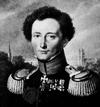Clausewitz, Carl (Philipp Gottlieb) von
- Clausewitz, Carl (Philipp Gottlieb) von
-
died Nov. 16, 1831, Breslau, Silesia
Prussian general and author.
Born to a poor middle-class professional family, he joined the Prussian army at age 12 and entered the War College in Berlin in 1801. After serving with distinction in the
Napoleonic Wars, he became a general and was appointed director of the War College (1818). His major work on
strategy,
On War (1832–37), analyzed the workings of military genius by isolating the factors that decide success in war. Rather than producing a rigid system of strategy, he emphasized the necessity of a critical approach to strategic problems. He asserted that war is a tool for achieving political aims rather than an end in itself ("merely the continuation of policy by other means") and argued that defensive warfare is both militarily and politically the stronger position. He also advocated the concept of
total war. Published posthumously,
On War had a profound influence on modern military strategy.
Carl von Clausewitz, lithograph by Franz Michelis after an oil painting by Wilhelm Wach, 1830.
By courtesy of the Staatsbibliothek, West Berlin
* * *
Universalium.
2010.
Look at other dictionaries:
Clausewitz, Carl (Philipp Gottlieb) von — (1 jun. 1780, Burg, cerca de Magdeburgo, Prusia–16 nov. 1831, Breslau, Silesia). General y autor prusiano. Nacido en una familia profesional de clase media, se incorporó al ejército prusiano a la edad de 12 años y entró a la Academia de guerra de … Enciclopedia Universal
Carl Philipp Gottfried von Clausewitz — Carl Philipp Gottlieb von Clausewitz (* 1. Juli 1780 als Carl Philipp Gottlieb Claußwitz in Burg bei Magdeburg; † 16. November 1831 in Breslau) war ein preußischer General, Heeresreformer und Militärtheoretiker. Clausewitz wurde durch sein nicht… … Deutsch Wikipedia
Clausewitz, Carl von — ▪ Prussian general Introduction in full Carl Philipp Gottlieb von Clausewitz born June 1, 1780, Burg, near Magdeburg, Prussia [Germany] died Nov. 16, 1831, Breslau, Silesia [now Wrocław, Pol.] Prussian general and military thinker, whose work… … Universalium
Carl Philipp von Clausewitz — Carl von Clausewitz Von Clausewitz Carl Philip Gottfried (ou Gottlieb) von Clausewitz (1er juin 1780 à Magdebourg 16 novembre 1831 à Breslau) est un officier et théoricien militaire prussien. Il est l auteur d un t … Wikipédia en Français
von — /von/; Ger. /fawn/, unstressed /feuhn/, prep. from; of (used in German and Austrian personal names, originally to indicate place of origin and later to indicate nobility): Paul von Hindenburg. * * * (as used in expressions) Friedrich Leopold… … Universalium
carl — carlish, adj. carlishness, n. /kahrl/, n. 1. Scot. a. a strong, robust fellow, esp. a strong manual laborer. b. a miser; an extremely thrifty person. 2. Archaic. a churl. 3. Obs. a bondman. Also, carle. [bef. 1000 (in compounds; see HOUSECARL);… … Universalium
Carl — /kahrl/, n. a male given name, form of Charles. * * * (as used in expressions) Andre Carl Bach Carl Philipp Emanuel Carl XVI Gustaf Carl Gustaf Folke Hubertus Clausewitz Carl Philipp Gottlieb von Correns Carl Erich Cuno Wilhelm Carl Josef Ditters … Universalium
Carl — ► (1895 1982) Compositor, director de orquesta y profesor alemán. Obras: Carmina Burana (1937), Catulli Carmina, El triunfo de Afrodita (1951) y Comoedia de Christi resurrectione (1955). * * * (as used in expressions) Andre, Carl Bach, Carl… … Enciclopedia Universal
Philipp — (as used in expressions) Bach Carl Philipp Emanuel Clausewitz Carl Philipp Gottlieb von Haeckel Ernst Heinrich Philipp August Melanchthon Philipp Philipp Schwartzerd Semmelweis Ignaz Philipp Telemann Georg Philipp * * * … Universalium
Philipp — (as used in expressions) Bach, Carl Philipp Emanuel Clausewitz, Carl (Philipp Gottlieb) von Haeckel, Ernst (Heinrich Philipp August) Melanchthon, Philipp Philipp Schwartzerd Semmelweis, Ignaz (Philipp) Telemann, Georg Philipp … Enciclopedia Universal
 Carl von Clausewitz, lithograph by Franz Michelis after an oil painting by Wilhelm Wach, 1830.By courtesy of the Staatsbibliothek, West Berlin
Carl von Clausewitz, lithograph by Franz Michelis after an oil painting by Wilhelm Wach, 1830.By courtesy of the Staatsbibliothek, West Berlin